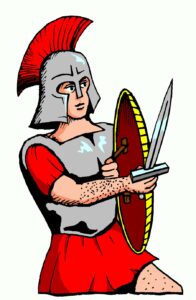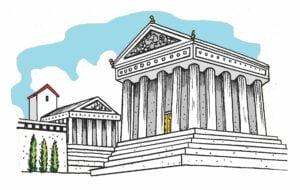 We know him as the Greek who slayed the Minotaur of the Cretan king Minos. What did he do before that?
We know him as the Greek who slayed the Minotaur of the Cretan king Minos. What did he do before that?
His birth
His birth is interesting. It is said that he was the son of Aegeus, King of Athens.
Aegeus had a problem, just like Henry VIII, he needed a son, he knew several women but none of them bore him a son. Remember this is Greek Mythology, which meant that he went and asked the Oracle of Delphi, what he had to do to get a son.
The oracle’s response was quite cryptic, and he couldn’t make it out. So, on his way home he visited the wise king, Pittheus of Troezen asked him to explain what the oracle had told him.
The wise king understood and got Aegeus drunk, then the King Pitteus’s daughter Princess Aethra decided to spend the night with him.
Now remember this is Greek Mythology.
I say this because Mythology tells us that during the night the goddess Athena came to Aethra in a dream. She was told to go to the beach and make an offering to the gods. She went and there low and behold Poseidon, the god of the seas appeared from the sea, then it appeared she became pregnant!
Now when King Aegeus realised she was pregnant he told her that no one was to be told about the pregnancy. However, when her son became of age, he should come to Athens and assume his rightful place as the Prince of Attica. He knew it was a son, because, again, this is Greek Mythology! King Aegeus realised that he would need to know when he arrived. Therefore, the King placed a sword beneath a huge boulder. He then instructed that the son be called, Theseus. King Aegeus then left instructions that when Theseus was old enough to lift the boulder, he should pick it up and bring the sword to him in Athens.
The Sword
The boy was born, was named Theseus, when he came of age, he lifted the boulder, collected the sword and left for Athens, on foot!
His journey to Athens
I said this is Greek Mythology, so , of course, the journey wasn’t easy.
Along the way he met many obstacles:
- One was Periphetes, famous for his iron club. Theseus disarmed and killed him, using the club and went on with his journey.
- He crossed paths with Cercyon, who challenged everyone to a one-on-one fight without any weapons then killed them when they lost. Theseus beat him using a new form of fighting, one we now call Graeco-Roman wrestling.
- And, of course, he was attacked by a wild boar.
But, none of them stopped him and he arrived in Athens.
His arrival in Athens
 King Aegeus, who was now getting on a bit, had been told by his sorceress, Medea, that Theseus was coming.
King Aegeus, who was now getting on a bit, had been told by his sorceress, Medea, that Theseus was coming.
However, when he arrived Medina told the King that a stranger intent on the destruction of the Kingdom had arrived.
Medina then hatched a plot with the King to poison Theseus when he arrived.
So, when he was shown into the King’s presence, the King offered him a cup of poisoned wine.
Theseus raised the cup to toast the King, this exposed the sword the King was waiting for.
He immediately jumped forward, knocked the wine out of Theseus’s hand and embraced him.
The Musical
This is where we get to our musical.
 Once in the Palace, he learnt the fate of seven Athenian youths and seven maidens, who were drawn by lots every seven years. He was shocked to learn that they were being sent to be eaten by the Minotaur under King Minos’s castle.
Once in the Palace, he learnt the fate of seven Athenian youths and seven maidens, who were drawn by lots every seven years. He was shocked to learn that they were being sent to be eaten by the Minotaur under King Minos’s castle.
This horrified him so much he decided to stop this and go with the children and kill the Minotaur.
This is the story we tell in our musical Theseus and the Minotaur.
A 50 minute musical, with 12 songs that children can’t help singing, and everyone will enjoy. You can download it from Educational Musicals.co.uk just click on https://educationalmusicals.co.uk/?product=monster-of-the-maze
Isn’t history fun?
10 Questions to ask on Theseus:
- What are some key characteristics that make Theseus a quintessential Greek hero?
- Can you explain the significance of Theseus’ journey to Athens and the adventures he had along the way?
- Who aided Theseus in his quest to defeat the Minotaur, and how did they assist him?
- What role did Theseus play after his victory over the Minotaur, according to the legend?
- Could you elaborate on the tradition of using Theseus’ ship as a tribute to Apollo?
- What led to Theseus’ unfortunate demise, according to the legends?
- In addition to being a hero, what other roles or attributes are associated with Theseus in Greek mythology?
- How do scholars interpret the existence of Theseus in historical terms?
- What evidence or clues do archaeologists use to investigate the potential historicity of Theseus?
- Ultimately, what remains uncertain about the reality of Theseus, despite scholarly inquiry and archaeological efforts?
To learn more about Theseus go to:

